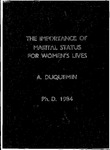THE IMPORTANCE OF MARITAL STATUS FOR WOMEN'S LIVES
| dc.contributor.author | DUQUEMIN, ANTHEA | |
| dc.contributor.other | Faculty of Arts, Humanities and Business | en_US |
| dc.date.accessioned | 2013-09-10T09:33:18Z | |
| dc.date.available | 2013-09-10T09:33:18Z | |
| dc.date.issued | 1984 | |
| dc.identifier | NOT AVAILABLE | en_US |
| dc.identifier.uri | http://hdl.handle.net/10026.1/1616 | |
| dc.description.abstract |
This thesis aims to investigate the ways in which women's marital status influences various aspects of their lives. With the growing sociological interest in women many statements have been made and theories put forward, the majority of which assume women to be wives and mothers. The intention of this thesis is to examine whether such theories are relevant to all women, irrespective of their marital status and merely because of their gender, or only to those women who have husbands of their own. Much emphasis has been placed on context in this study, for individuals' lives can only clearly be seen against their wider background and within the opportunities and restrictions of their particular surroundings, and for this reason the research was undertaken entirely within one small town, with women of working class origins and amongst women of two distinct age groups (over seventy and twenty to forty-five) thereby restricting the geographical, cultural and historical settings. Secondary sources, a survey questionnaire and in-depth interviewing were all used in this study. The former two provided information on the historical and contemporary background to, and content of women's lives, whilst in-depth interviewing with twenty women explored personal actions and feelings on a deeper level. The research suggested that improved standards of living have altered and blurred the reasons for which women of working class origins marry and hence influenced their understanding of marriage. Wider opportunities for more diverse ways of behaving permit currently unmarried women more variation from their married contemporaries in the practical aspects of their lives than was the case earlier this century. Both older and younger unmarried women , however , indicate considerable differences from married women in the internal and emotional aspects of their lives, suggesting that further consideration need be taken of marital status when discussing women as a group. | |
| dc.description.sponsorship | DEPARTMENT OF SOCIOLOGY, UNIVERSITY OF ESSEX | en_US |
| dc.language.iso | en | en_US |
| dc.publisher | University of Plymouth | en_US |
| dc.title | THE IMPORTANCE OF MARITAL STATUS FOR WOMEN'S LIVES | en_US |
| dc.type | Thesis | |
| plymouth.version | Full version | en_US |
| dc.identifier.doi | http://dx.doi.org/10.24382/4484 |
Files in this item
This item appears in the following Collection(s)
-
01 Research Theses Main Collection
Research Theses Main


